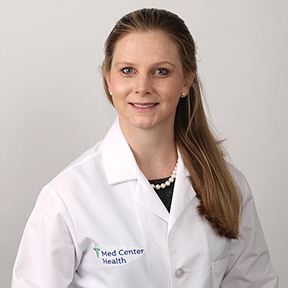
Women in their 20s and 30s have a lot of demands on them. Making sure your physical health is under control is the best way to handle the demands made of you every day. If you think you feel pretty good so you don’t need a doctor, consider that many chronic illnesses – such as high blood pressure – begin with little or no symptoms.

You might also think you don’t need to see an obstetrician/gynecologist (OB/GYN) until you’re ready to have a baby. But the American College of Obstetricians and Gynecologists recommends that reproductive health visits begin at ages 13-15. Many family medicine doctors and pediatricians help young women navigate the transition into adulthood. Even so, young women can feel awkward talking about their periods or may not know what questions to ask.
“My pediatrician was my classmate’s father,” says Sara Moscow, M.D., OB/GYN with Women’s Health Specialists. “At that age, I didn’t really know what was normal, which made it hard for me to ask good questions! Sometimes, seeing a provider whose true focus is women’s reproductive health can just be a little more straightforward. It’s a good idea to see an OB/GYN any time you have a question about puberty, periods, fertility, pregnancy, sexual health, menopause or pelvic pain.”
Dr. Moscow continues, “I want you to feel safe, respected and heard. A lot of women get self-conscious if they are bleeding when they come to see me. Don’t be! I need to see what is normal, or abnormal, for you. A lot of people worry about having to have an invasive exam – but depending on the reason you are there, that may not be necessary.”
Why see an OB/GYN?
There are many reasons why young women may want to see an OB/GYN – pregnancy, pelvic infections, ovarian cysts, irregular periods, infertility, pain with sex, urinary incontinence or pelvic floor dysfunction especially after having a baby. Another reason is to talk about getting the HPV vaccine if you weren’t vaccinated as a child. HPV can cause cervical cancer and genital warts, as well as head and neck cancers. “The recommendations have recently changed to increase the age range to allow older women to receive the HPV vaccine, which is so important,” says Dr. Moscow. “I have definitely counseled widows and new divorcées to think about receiving this vaccine.”
Another topic to discuss with an OB/GYN is contraception. If you choose to use contraception, it’s important to find the right option for you. Basic questions to discuss with your gynecologist are:
- When do you want to have a baby?
- If you could describe an ideal period, what would it be like?
- Are you good at taking pills daily? If not, you might want to consider a vaginal ring or injection.
- And everything else – medical problems, family history, previous birth control and so on.
There are also medical conditions that mean you cannot take certain forms of contraception. These are all things that are important to discuss with your doctor, including what side effects there might be.
What about the pandemic?
Unfortunately, the COVID-19 pandemic has had an effect on the health of many women. Some are delaying routine maintenance or non-emergent medical issues because they are afraid to go to the doctor or don’t have childcare. Some women have even delayed prenatal care. “We have seen some sicker patients than usual,” says Dr. Moscow. “As a mother, I understand. My three-year-old licks floors, so I do not want to take him to a doctor’s office! But prenatal care is super important.” Dr. Moscow, herself, gave birth this past year, so she understands all the concerns an expectant mother has with the pandemic, including the worry that family will not be able to attend the birth. “I know it’s not the same as being with your family,” she says, “but I know I speak for all the hospital staff when I say we really do cherish the opportunity to be with you during childbirth and postpartum care.”
If you have questions about seeing an OB/GYN or would like to make an appointment, call Women’s Health Specialists at 270-781-0075. Learn more at MedCenterHealth.org.
-submitted by Med Center Health




